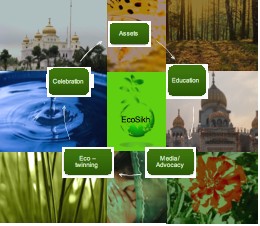
EcoSikh: reconnecting Sikhs and the environment
Coblogged by Camille and Reema
This week is Energy and Environment week. The environment has been front page news for a while now and one Sikh group is getting involved. 
Recently, SCORE launched a new initiative called EcoSikh, a project driven towards promoting environmentalism and environmental stewardship particularly in Punjab, but in the Sikh community at large. EcoSikh is the Sikh contribution to a larger project between the UNDP and the Alliance for Religions and Conservation (ARC, a UK-based NGO). UNDP and ARC are funding many religious communities to develop plans and ideas to integrate environmental consciousness into their members’ communities and personal behavior.
The program plans to work through 5 areas it has identified as: assets (using existing skills, time, resources for environmental projects), media/advocacy, eco-twinning (developing relationships of mutual benefit between various Sikh communities by sharing environmental ideas), celebration, and education. Each of the 5 program areas has been rooted in Sikh theology as a reminder of the historic import and connection with the environment in the Guru’s bani. A draft of the plan can be found here.
We read the press release on this initiative cautiously; why wasn’t there broad grassroots information regarding the project, and where did EcoSikh plan to go from here? Most importantly, we wondered why a predominantly American-focused organization had chosen such a labor-intensive project based primarily abroad.
The Langar Hall has discussed the need for environmentally sustainable practices within our communities, our gurdwaras, and our homes. Perhaps our caution is rooted in an issue that often resurfaces; should change within the Sikh community come from the bottom, or from the top? Given that the goals of the project are to change individuals’ and communities’ lifestyles, a bottom-up approach would seem far more appropriate. I find it hard to believe that target groups will change their habits to conform to the ‘expertise’ of others without already being invested in the project.
However, despite our wariness, we hope positive results stem from this initiative. Commenters have mentioned gurdwaras going green by using steel thaals and trying to reduce waste, and perhaps there are more creative ideas already being implemented that could be shared through a permanent Sikh-environmental forum such as EcoSikh.
The authors of the plan are attempting to set realistic expectations. They do not claim to represent all Sikhs and acknowledge that any success depends on the involvement of individuals, gurdwaras, families and communities. Whether and how these groups are engaged will determine the success of the project.
*Disclaimer: One of us has been marginally involved with initial steps of the project.













